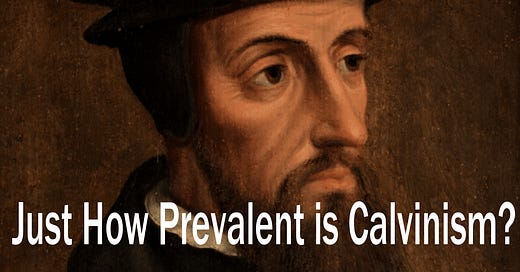Just How Prevalent Is Calvinism?
Just how prevalent is Calvinism? Perhaps not as prevalent as you may believe. This video also addresses the resurgence in Calvinism demonstrated by the New Calvinists.
Just How Prevalent is Calvinism?
Kevin Probst
4/13/2025
Today I want to answer the question Just How Prevalent is Calvinsim?
In the little corner of the world in which I live, Calvinism seems to be quite common. It feels like just about every other Christian I come in contact with are three, four or even five point Calvinists. Sometimes we construct our perceptions of the greater world beyond us by the influences of the smaller bubble in which we live.
Dave Armstrong, a Catholic apologist, has written a book entitled A Biblical Critique of Calvinism. He states from the viewpoint of “Christian sociology” or “Christian demographics”, those who label themselves Christians in our world population are about 2.6 billion. He breaks the demographics down in the following manner: There are 1.3 billion Catholics, 1 billion Protestants and 260 million Orthodox.
When Armstrong crunches the numbers he declares that Calvinism composes about 7% of the Protestant denominations. However, when considering all of the 2.6 billion people who identify as Christian, Calvinists make up approximately “2.7%, or 1 out of every 37 Christians in the world.”
The Calvinist label is very broad. There is a vast difference between a two-point Calvinist and a five-point Calvinist. It seems Armstrong’s analysis of the numbers clumps all of these Calvinistic types together. A survey taken by the Baptist Press indicated a wide range of differences within the Southern Baptist Church when Calvinism is categorized. Although 30% of Southern Baptist pastors consider their church to be reformed, only 10% identified as five-point Calvinists.
Although a very small minority may follow the path of Calvinism, the recent resurgence of this particular theology must not be denied. I had never heard of Calvinism back in the 80’s and 90’s. But I was very much aware of the trend in Protestant churches who embraced a more pragmatic approach in church planting and growth. The goal was to bring in the numbers and build the church much like one would build a corporation.
The Church Growth Movement was led by men like Bill Hybels and Rick Warren. The goal of the ‘seeker friendly’ movement was to fill the pews by any means necessary. Once these people were lured into the church they were then exposed to the gospel of Christ. Who can question the motive? They wanted to win people to Christ.
However, with so much emphasis on evangelizing the lost, many of their congregants felt like the primary mission of the church was to disciple the sheep already within the fold. Their yearning for deeper spiritual growth created a demand for deeper scriptural and theological insight. While many pastors and churches were adopting a more entertaining format to improve their numbers, others experienced a renewed hunger for a deeper plunge into biblical truth.
The desire to fill the void created by a more shallow approach to the gospel led to a renewed interest in Neo-Calvinism and Reformed Theology among the Young and Restless Ones. These were attracted to a deeper dive into theology offered by the Reformed approach. Exegetical preaching, the method of meticulously analyzing scripture verse by verse and delivering this analysis to the congregation became very popular.
The movement was fueled by very infuential preachers like R.C. Sproul, John Piper, John MacArthur, Mark Dever and many others.
Whether you agree with the Reformed Theology of the Neo-Calvinists, it seems irrefutable that they are a small minority among those who claim to be Christian but there has been a significant resurgence of Calvinism in recent decades.
Perhaps we can explore the reasons for this renewed interest in the theology of John Calvin in my next video.







Kevin.... respectfully what is missing from the supporting evidence you offer on the percentage of those who support some version (point(s)) of Calvinism is that your research primarily juxtaposes it against the term "Christian." I submit that that term, as relates to eternal live in Heaven is largely impotent as it includes millions of secular Christians who do not have a personal relationship with the Lord. If one was omniscient and could discern exclusively from a subset of true born-again believers, the percent of those with a Calvinist leaning vs. Arminianism, I think the percents would be more reflective of your underlying point.